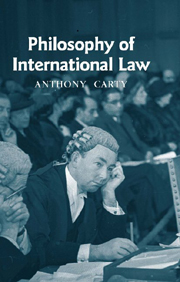Book contents
- Frontmatter
- Contents
- Preface and Acknowledgments
- 1 What Place for Doctrine in a Time of Fragmentation?
- 2 Continuing Uncertainty in the Mainstream
- 3 International Legal Personality
- 4 The Use of Force
- 5 American Legal Cultures of Collective Security
- 6 Marxism and International Law
- 7 Resistances to the Neoliberal International Economic Order
- 8 From an Order of Fear to One of Respect
- Index
8 - From an Order of Fear to One of Respect
Published online by Cambridge University Press: 12 September 2012
- Frontmatter
- Contents
- Preface and Acknowledgments
- 1 What Place for Doctrine in a Time of Fragmentation?
- 2 Continuing Uncertainty in the Mainstream
- 3 International Legal Personality
- 4 The Use of Force
- 5 American Legal Cultures of Collective Security
- 6 Marxism and International Law
- 7 Resistances to the Neoliberal International Economic Order
- 8 From an Order of Fear to One of Respect
- Index
Summary
Fear in the Western Liberal Tradition: Ricoeur's Response to Hobbes and Hegel
The predominant anthropology for the place of law in international relations, whether on the side of state sovereignty or international organization, or constitution, has been a radically subjectivist, individualist one. The state of nature, in which sovereign states still find themselves, is reinforced by predatory doctrines of pre-emption in the area of national security and of relentless expansion in the area of economic activity, itself continuously dominated by security interests. This analysis may not be disputed by legal internationalists or constitutionalists. They continue to set themselves the task of harnessing the beast of the state, Aron's ‘cold monsters,’ into a disciplined framework. There is no reason or wish to obstruct or denigrate these internationalist, constitutionalist efforts. However, their limitations need to be both understood and complemented by a new anthropology of international law. This belief is itself fired by a suspicion that internationalist or constitutionalist endeavors face, ultimately, insuperable obstacles of value incommensurability and power/social fragmentation, but it is hardly necessary to provide final ontological proof of such a suspicion. Both major internationalist projects, the United Nations and the World Trade Organization, are in deep enough crisis, where it is apparent to the mildest observer that egotistical or subjective power considerations dominate the Western treatment of the non-Western world, as they have since the foundation of the rapacious modernity so well described by Tuck.
- Type
- Chapter
- Information
- Philosophy of International Law , pp. 221 - 248Publisher: Edinburgh University PressPrint publication year: 2007



